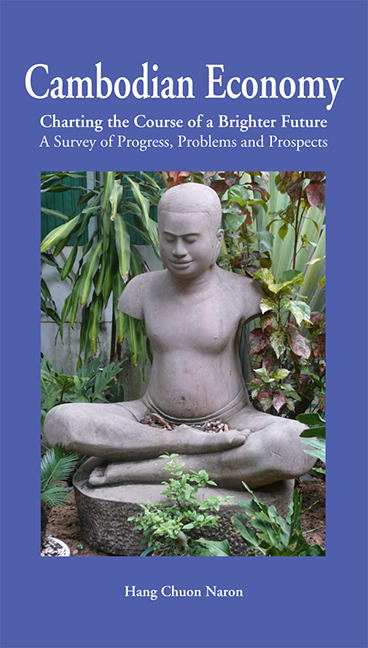 Cambodian Economy
Cambodian Economy Book contents
- Frontmatter
- Contents
- Foreword
- Preface
- INTRODUCTION
- Symbols and abbreviations
- PART I GEOGRAPHY AND POPULATION
- PART II MACROECONOMIC FRAMEWORK
- PART III THE CHALLENGE OF MODERNIZING AGRICULTURE
- PART IV THE CHALLENGE OF INDUSTRIALIZATION
- PART V SERVICES AND INFRASTRUCTURE
- PART VI HUMAN RESOURCE DEVELOPMENT
- PART VII PUBLIC FINANCE
- Chapter 20 Tax System
- Chapter 21 State Budget
- PART VIII INTERNATIONAL ECONOMIC RELATIONS
- PART IX CONCLUSION
- Bibliography
- About the author
Chapter 20 - Tax System
from PART VII - PUBLIC FINANCE
Published online by Cambridge University Press: 21 October 2015
- Frontmatter
- Contents
- Foreword
- Preface
- INTRODUCTION
- Symbols and abbreviations
- PART I GEOGRAPHY AND POPULATION
- PART II MACROECONOMIC FRAMEWORK
- PART III THE CHALLENGE OF MODERNIZING AGRICULTURE
- PART IV THE CHALLENGE OF INDUSTRIALIZATION
- PART V SERVICES AND INFRASTRUCTURE
- PART VI HUMAN RESOURCE DEVELOPMENT
- PART VII PUBLIC FINANCE
- Chapter 20 Tax System
- Chapter 21 State Budget
- PART VIII INTERNATIONAL ECONOMIC RELATIONS
- PART IX CONCLUSION
- Bibliography
- About the author
Summary
Cambodia's tax system is organized around two regimes: the self-assessment regime and the estimated regime.
Self-Assessment Regime
Based on the declaratory principle, the self-assessment regime implies that taxable persons determine themselves their basic taxable amount and pay their tax without the intervention of tax authorities.
To start with, the tax authorities receive the tax return from taxable persons. They then audit the tax return that has been submitted of the taxable person's own accord in order to check whether the income declared complies with the information included in the taxable person's file and whether the latter complies with the regulatory provisions in force in terms of taxation.
This system has the following benefits:
• Liable persons are responsible for the information contained in their tax return.
• They submit their tax return of their own accord and pay the tax calculated from the information declared.
• Administrative expenses are reduced.
• The tax authorities have more time to check taxable persons in breach of regulations (undeclared activities or using organized tax evasion networks).
• Enforcement of laws is strengthened.
Persons subject to the self-assessment regime are all kinds of import, export or investment companies with a minimum annual taxable turnover of:
a. 500 million riels for companies providing goods.
b. 250 million riels for service sector companies.
c. 125 million riels for companies that are bound by contract with the government.
In late 2008, Cambodia had a total of 11,196 companies; 2,933 of which were small-, medium- or large-size activity companies (and that have submitted their tax return to the Tax Department). They are divided into 1,793 large-size companies, and 9,403 small/ medium-size companies. Self-assessment regime now spreads over all provinces and 7 districts in Phnom Penh. Revenue originating from taxes of taxable persons subject to the self-assessment regime account for 90 percent of the total revenue of the tax department with regards to taxes on industrial profits.
- Type
- Chapter
- Information
- Cambodian EconomyCharting the Course of a Brighter Future - A Survey of Progress, Problems and Prospects, pp. 407 - 420Publisher: ISEAS–Yusof Ishak InstitutePrint publication year: 2012


